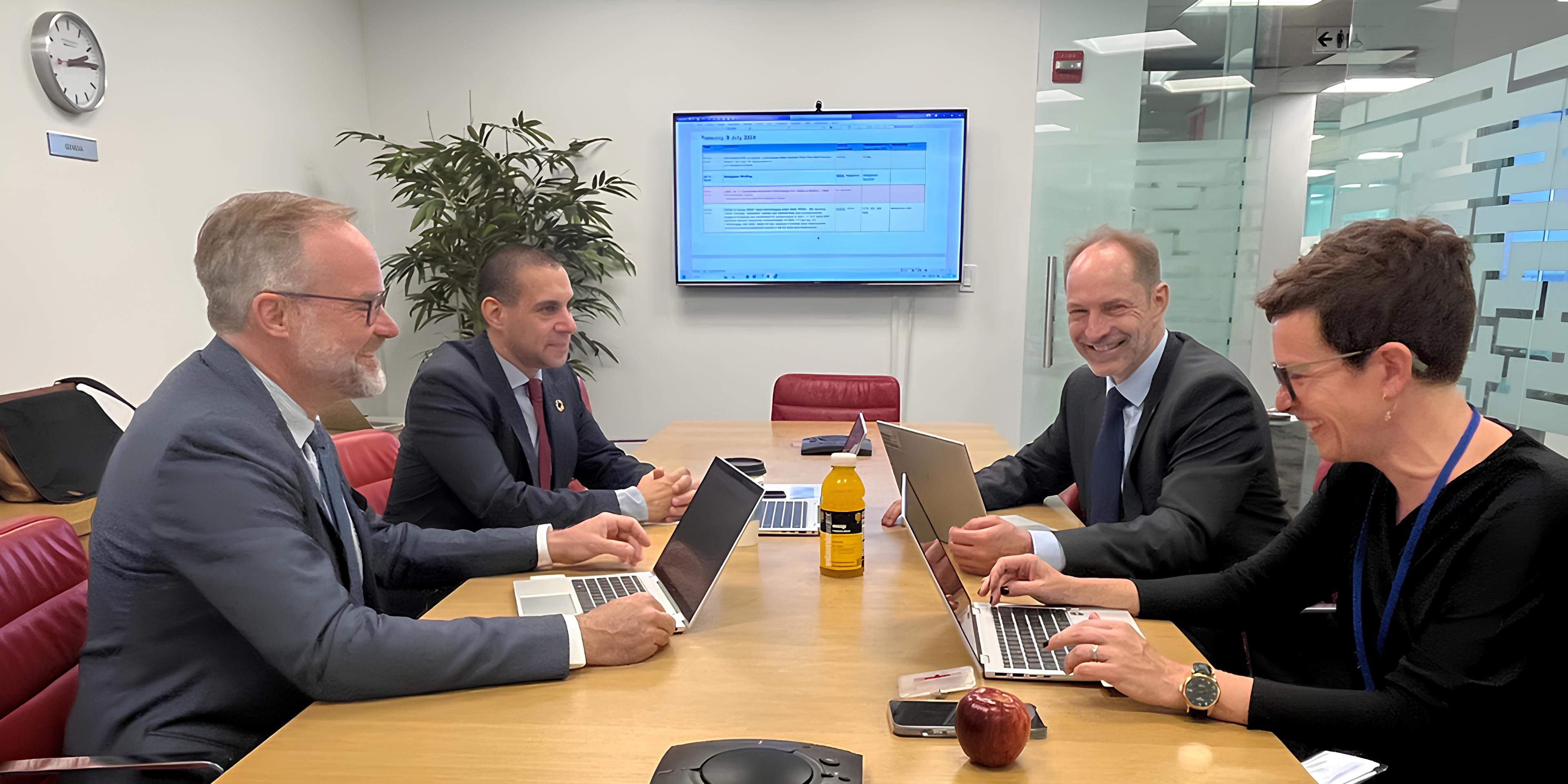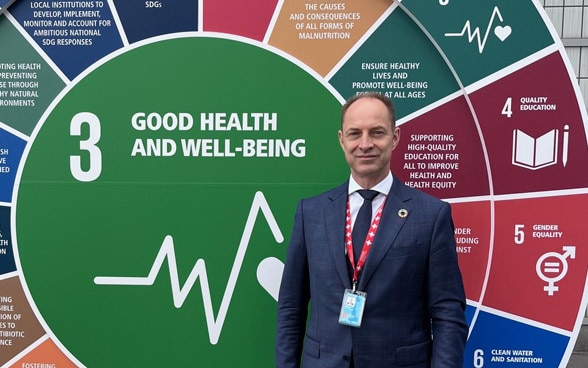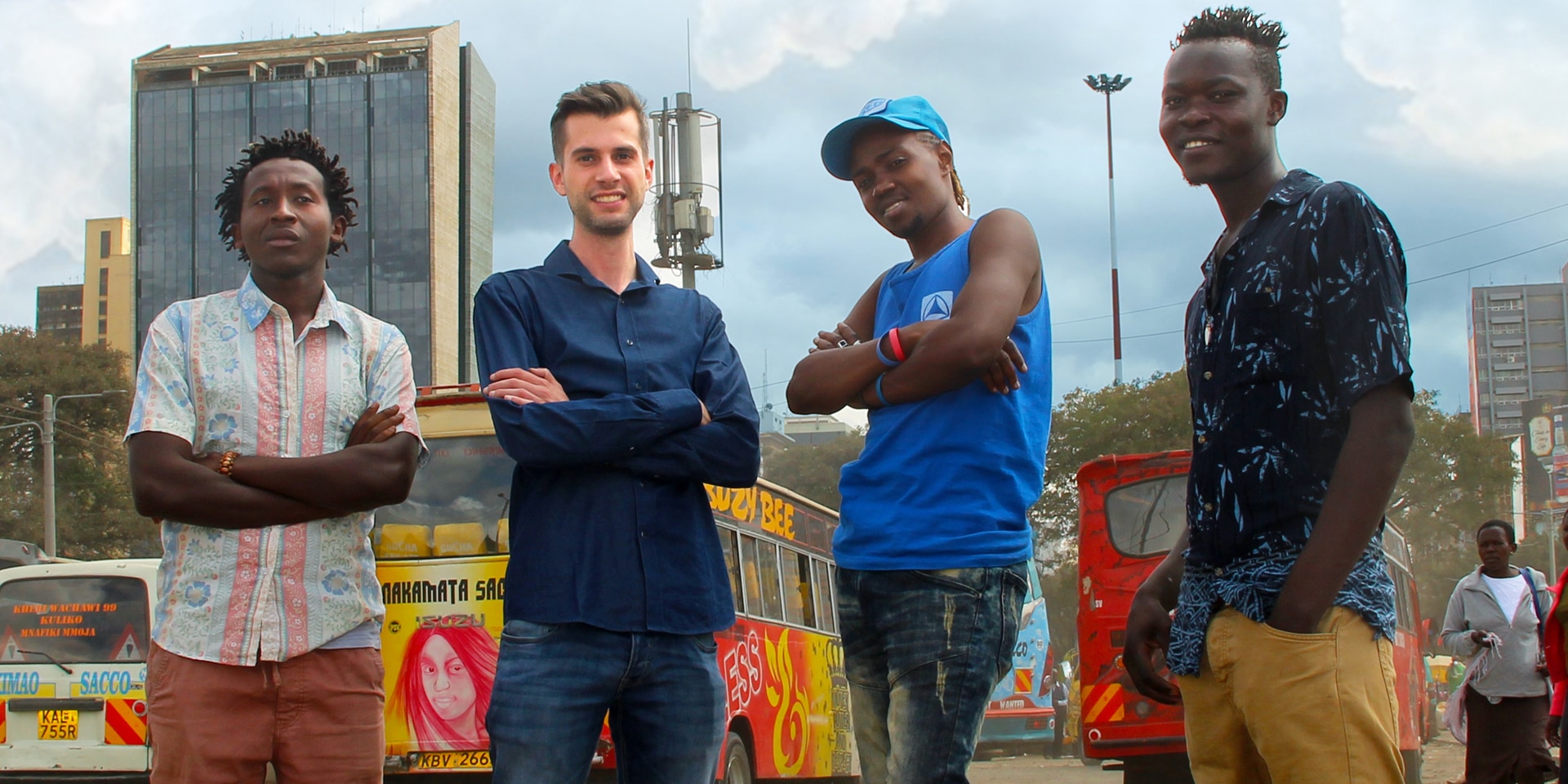Accelerating sustainable development: how can we make it happen?
The 2030 Agenda for Sustainable Development calls on all 193 UN member states to join forces in tackling a comprehensive list of pressing challenges, from poverty to cooperation and beyond. In Switzerland, two Federal Council delegates are responsible for the Agenda's implementation: Markus Reubi, deputy head of the Prosperity and Sustainability Division (PSD) within the FDFA's State Secretariat and Daniel Dubas, head of the Sustainable Development Section at the Federal Office for Spatial Development (ARE) of DETEC. Following the ARE's two-year term as chair, the FDFA is now presiding over the Federal Administration's steering committee, which is responsible for guiding the Agenda's implementation. We interviewed Mr Reubi, who provided insights into the challenges, priorities, and projects for the coming two years.

Markus Reubi, Deputy Head of the Prosperity and Sustainability Division at the FDFA, Daniel Dubas, Head of the Sustainable Development Section at the DETEC, Astrid Wüthrich, Vice Director of the Federal Social Insurance Office at the FDHA, and Benjamin Rothen, Head of the International and National Affairs Section at the FDHA, in the context of the preparations for the High-Level Political Forum in New York. © FDFA
The 2030 Agenda for Sustainable Development was adopted by all UN member states in 2015. With 17 Sustainable Development Goals (SDGs), 169 targets and over 200 indicators, it is highly ambitious. The SDGs focus on policy areas as diverse as the fight against poverty, food security, access to education and renewable energies, gender equality, and the protection of marine resources and terrestrial ecosystems. As the SDGs are intertwined, the Agenda brings together the three dimensions of sustainability: environmental, economic and social.
The Federal Council views the 2030 Agenda as the appropriate framework for tackling sustainability challenges. The implementation of the 2030 Agenda at federal level is therefore part of not just the foreign policy strategy, but also numerous sectoral strategies concerning international cooperation, sustainable development, education, research and innovation, foreign trade, and more. Beyond this, the cantons, cities and communes as well as the private sector, scientific community and civil society are increasingly aligning their work with the SDGs.
Where does Switzerland stand in terms of implementation? Since 2015, it has come closer to achieving the SDGs in various areas. This applies, for example, to the supply of energy from renewable sources. Global progress has been made with regard to reducing child mortality. We should recognise this progress, but also put it into context. Switzerland's country report to the UN, compiled every four years on a voluntary basis, provides information on the current status and the progress made. At the same time, it sheds light on what remains to be done – and the needs are considerable, at both national and international level: Extreme poverty has been on the rise worldwide since 2020, women's rights are coming under increasing pressure and biodiversity is decreasing. And those are just three of the areas demonstrating that we must renew and redouble our efforts in implementing the 2030 Agenda.
Interview with Federal Council Delegate for the 2030 Agenda Markus Reubi
Mr Reubi has been following the growing challenges in sustainable development for several years from different perspectives. Before becoming deputy head of the Prosperity and Sustainability Division at the FDFA in Bern, he was responsible for bilateral science cooperation between Switzerland and China in Beijing, among other things. He also headed the Swiss Business Hub in Canada and the diplomatic section of the embassy in Japan.

Mr Reubi, what are your responsibilities as the Federal Council Delegate for the 2030 Agenda, and what does the FDFA's leadership in implementation over the next two years entail?
As Delegate, I chair the Federal Administration's steering committee for the 2030 Agenda, which includes 16 federal offices and the Federal Chancellery at senior management level.
I also liaise with the head of the department and, through him, with the Federal Council – for example, when it comes to setting priorities or approving the country report. Together with my team in the Prosperity and Sustainability Division (PSD) at the FDFA, and with support from the ARE, we coordinate the work on the country report. In addition, we represent Switzerland at the UN, particularly at the annual High-Level Political Forum. And in other organisations, we participate in events on sustainability and use various communication channels. My guiding principle is to use concrete examples to show how we are implementing the SDGs and making progress together. To date, there is no better frame of reference for sustainable development.
What opportunities, but also challenges, arise in the cooperation between the FDFA and DETEC (ARE) in the implementation of the 2030 Agenda?
The Federal Council has chosen a new, innovative form of organisation: the alternating chairpersonship. This makes it possible to optimise coherence between domestic and foreign policy. DETEC (ARE) tends to look inwards, while the FDFA brings in the perspective from the UN and the international environment in general. The two cannot be separated - so we complement each other well. Managing resources presents a challenge, as the volume of work fluctuates due to the alternating chairpersonship. At the same time, by linking the two processes – country reporting and 2030 SDS implementation – we can act more as a team, leverage synergies and help each other out. The fact that the 2030 Agenda implementation is anchored in two departments also ensures broader support.
Where has Switzerland made progress in implementing the SDGs?
Switzerland has established an efficient and lean implementation structure at federal level that does not call into question decentralised responsibilities and promotes cooperation across organisational boundaries.
Switzerland is also considered exemplary in terms of data and reporting quality, not least thanks to our highly dedicated Federal Statistical Office. There has also been progress in some sub-areas, such as the expansion of renewable energies. Overall, however, the conclusion from the last review and the 2022 country report still holds true: moving in the right direction but not fast enough. For details on how far we've come in achieving the goals, check out SDGital2030.ch.
Switzerland attaches great importance to multilateralism in the implementation of the 2030 Agenda. What are the consequences when multilateral cooperation becomes more difficult?
This can be illustrated by taking a look at the High-level Political Forum on Sustainable Development: The forum was conceived as a platform for consensus-building and experience-sharing, but in recent years it has increasingly become a stage for geopolitical rivalry. The consensus created in 2015 with the adoption of the 2030 Agenda and the associated high aspirations are increasingly being called into question. But this 'misuse' of multilateral institutions is only one reason why we are not on track in implementing the SDGs. A lack of political will in view of pressing problems, especially as regards security, is another reason.
"For Switzerland, there is still no alternative to multilateralism when it comes to developing joint solutions to global challenges." In future, cooperation with sub-state communities and non-state actors will play an even more important role. In response to this, Switzerland has launched various initiatives. For example, we are supporting the expansion of the UNECE Mayors' Forum in Geneva – an international forum where cities can share ideas directly on the implementation of the 2030 Agenda and learn from each other.
Where do you see the thematic priorities in implementing the 2030 Agenda for Sustainable Development over the next two years and what challenges do you expect to face?
In Switzerland, we are generally guided by the 2030 Sustainable Development Strategy, which was adopted by the Federal Council in 2021. The Strategy sets three priority topics: sustainable consumption and sustainable production; climate, energy and biodiversity; and equal opportunities and social cohesion. If we break this down into individual goals, the Agenda's goal 12.3, for example, states that per capita food waste should be halved, at retail and consumer level. Goal 12.3 of the 2030 Agenda provides for a halving in this respect – there is not much time left for implementation.
In addition to pursuing the substantive goals, which serve as benchmarks for the federal government, cantons and cities, as well as the private sector, civil society and scientific community, we also want to raise awareness of the 2030 Agenda as an instrument. To this end, with the teams at the PSD and the ARE working together, we will be using both the SDG Flag Day, which takes place every two years on 25 September, and the 2026 country report. Here, the successes and opportunities should also be communicated. This is not so easy, as we have a tendency to focus on the gaps and the remaining – undoubtedly large – challenges.
SDG Flag Day
SDG Flag Day takes place every year on 25 September. With the symbolic raising of the SDG flag, organisations, companies, communities, schools and governments worldwide express their support for the SDGs. This symbolic action was initiated by the UN Global Compact Country Networks. The federal government is also involved in SDG Flag Day: Markus Reubi and Daniel Dubas, the two Federal Council Delegates for the 2030 Agenda, will be in Lugano on SDG Flag Day to discuss the city's sustainability activities.


